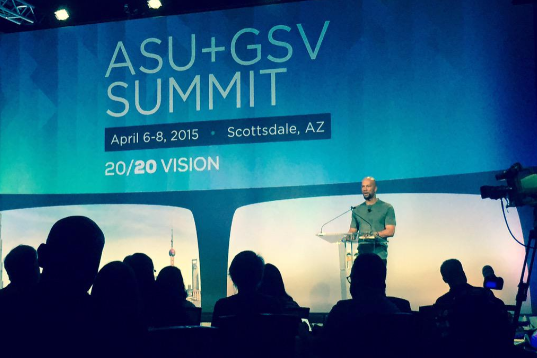Bringing Humanity Back into Education: Thoughts from the ASU/GSV Summit
April 13th 2016, Written by Sheri Smith
“So you are bringing ‘humanity’ back into the education process?” quipped Jamie Moran from the Florida Online School during the opening keynote of the ASU+GSV Summit. “Yes, can I quote you on that?” I replied. “That is exactly what Indigo is doing – and we are doing it in a scalable way that connects each student’s genius to something practical in the greater world.”
The ASU+GSV Summit (April 6-8) brought together some of the greatest innovative minds in today’s educational landscape, all addressing the question: “What is best for students?” Despite our deepest efforts to create an education system that empowers students, however, we have not been able to change the tragic fact that 20% of high school students have contemplated suicide. Somehow, we have been unable to communicate to these students the enormity of their potential impact – the difference one life can make in a community, a country, or the world.
Consider my friend Eric Gulstrom, who founded Educate at age 17. He has literally transformed the entire education system of Uganda with the simple idea that you can lift people out of poverty by incorporating social entrepreneurship into education.
Or what about Roberto Rivera, self-proclaimed “dope dealer converted to a hope dealer,” who found a way to inspire and engage inner-city youth through music, art, and self expression? There are countless stories of ordinary individuals literally changing the world, and it’s all possible for America’s youth. Yet the only thing many of them can see is an SAT score that won’t get them into a top university.
Where have we gone wrong?
When we reduce education down to academics, we inadvertently feed the children of America the lie that “if you don’t have straight A’s, you aren’t going to make it in the world.” However, the exact opposite is true: what matters in the real world generally has little to do with book knowledge. Creativity, resourcefulness, grit, kindness, and passion – these elements and many more are the defining characteristics of humanity, and they constitute true brilliance.
Throughout my work with Indigo, I have found that the “problem” students are often the most talented. At a recent teacher workshop we used one such individual as an example to help the teachers see students from a different perspective. When I revealed this young woman’s report to the teachers (she volunteered to share her information), I described her wildly creative mind, her capacity for futuristic thinking, and her extreme independence. I could see the teachers’ heads nodding; they all agreed that she was a bright light.
Then they began to voice their frustrations.
“. . . but she won’t read my books in English class.” “She won’t do her homework.” ”Her mind is always someplace else.”
I couldn’t help thinking, God bless her for being someplace else! I want to know what she is thinking about, imagining, and believing in, because it is quite possible that this high school student has answers to problems we haven’t even conceived of. What if her teachers’ goal was to harness her genius instead of corralling her into reading the “right” book in English class? That would be integrating humanity and education.
Like many at this month’s Summit, I believe that we need to look at education from a different perspective. Indigo makes it possible to incorporate hard science and measurable data into the education system, thus uncovering the specific qualities that constitute human brilliance. Since Indigo’s genesis in 2013, I have seen students once labeled “problems” begin to understand their own value, utilize their innate strengths, and take an interest in their education for the first time. It is my profound hope that by integrating non-academic skills with traditional educational structures, we can harness the human elements of an entire generation.
The ASU+GSV Summit is the Knowledge Economy’s Mecca of conversation and activism devoted to accelerating learning innovation around the world. The 2015 Summit brought together many of the greatest minds in education technology as well as innovators like Sir Richard Branson and Howard Schultz (CEO of Starbucks).

